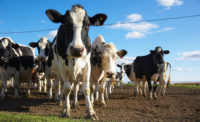Report: Plant-based beverage market worth $19.67B by 2023
The almond segment is projected to dominate the plant-based beverages market, in terms of value, through 2023.
The plant-based beverage market is estimated at $11.16 billion in 2018 and is projected to reach $19.67 billion by 2023, growing at a CAGR of 12% from 2018-2023, according to "Plant-based Beverages Market by Source (Almond, Soy, Coconut, and Rice), Type (Milk and Other Drinks), Function (Cardiovascular health, Cancer prevention, Lactose intolerance, and Bone health) and Region - Global Forecast to 2023,” a report published by MarketsandMarkets, New York.
The growth of the plant-based beverage market is attributed to the rise in companies penetrating this market by adding plant-based beverage products based on almond milk, soy milk and rice milk to their portfolio. Furthermore, the rise in vegan diets, especially in the UK and the United States, amidst the ethical concerns surrounding animal welfare, fats present in animal-based diets and the use of antibiotics, has boosted the consumption of plant-based beverages in these countries.
The almond segment is projected to dominate the plant-based beverages market, in terms of value, through 2023. The increased demand for dairy-free alternatives, rise in the number of lactose-intolerant individuals in major revenue-generating regions such as Asia Pacific and Africa, the increase in lifestyle-related diseases such as heart diseases and cancer in the United States and the rise in obesity in developing countries such as Argentina have boosted almond milk sales, both in terms of value and volume. The almond milk segment has also gained popularity in coffee shops and restaurants nationwide.
Based on type, the plant-based milk segment accounted for the larger share in the plant-based beverages market, in terms of value, in 2017. Manufacturers have been developing non-dairy alternatives such as almond milk, soy milk and coconut milk in a variety of flavors. They’re also introducing new sources such as oat milk, cashew milk, rice milk, hemp milk and pea milk.
The Asia Pacific market accounted for the largest share in the plant-based beverages market, in terms of value, in 2017. The region consists of key revenue pockets in countries such as China and Thailand, which are some of the key consumers of plant-based diet products. China is one of the largest consumers of soy milk, which is considered the most suitable alternative to dairy milk. Apart from this, Thailand is expected to be a key revenue pocket in coming years, with plant-based diets being one of the key trends in the country in 2018 per the U.S. Department of Agriculture (USDA).
Looking for a reprint of this article?
From high-res PDFs to custom plaques, order your copy today!






